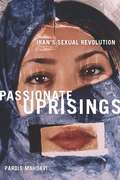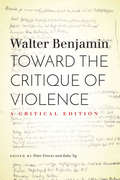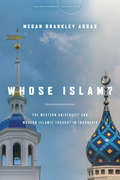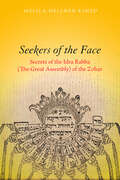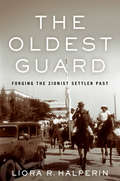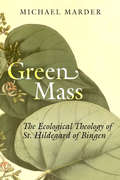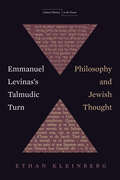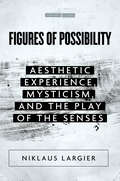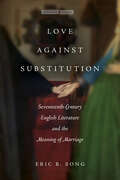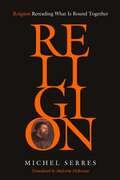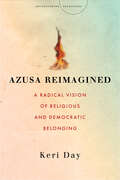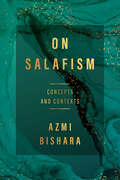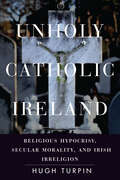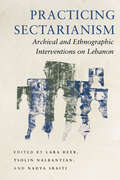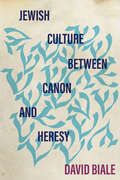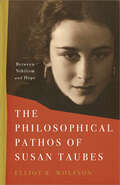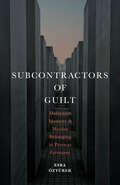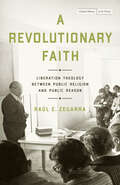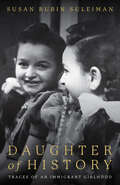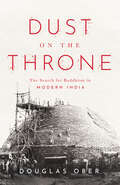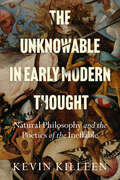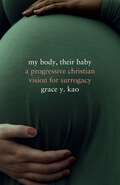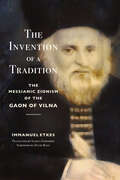- Table View
- List View
Passionate Uprisings: Iran's Sexual Revolution
by Pardis MahdaviThere is perhaps no place in the world today where the stakes of partying and having sex are higher than in present-day Iran. Drinking and dancing can lead to arrest by the morality police and a punishment of up to 70 lashes. Consequences for sex outside of marriage can be even more severe—up to 84 lashes, or even public execution. But even under the threat of such harsh punishment, a sexual revolution is taking place. Iranian youth continually risk personal safety to meet friends, date, and, ultimately, to have sex. In the absence of any option for overt political dissent, young people have become part of a self-proclaimed revolution in which they are using their bodies to make social and political statements. Sex has become both a source of freedom and an act of political rebellion. With unprecedented access inside turn-of-the century Iran, Pardis Mahdavi offers a firsthand look at the daily lives of Iranian youth. They are given a voice as she tells the stories of their intertwined quests for sexual freedom, political reform, and a better future—but not a future without risk. The sexual revolution is also leading to increased levels of abortion, HIV/AIDS, sexually transmitted diseases, and ongoing emotional troubles and mental illnesses, with worrying implications for Iranian youth and Iranian society at large. Passionate Uprisings is a fascinating, ground-breaking, and personal look into a society that is poorly understood—if it is understood at all—by the majority of Westerners today. Mahdavi's narrative provides not only an invaluable insight into the real lives of much of Iran's population, but shows how sexual politics and the youth culture could even destabilize the current regime and change the course of Iranian politics.
Toward the Critique of Violence: A Critical Edition
by Walter BenjaminMarking the centenary of Walter Benjamin's immensely influential essay, "Toward the Critique of Violence," this critical edition presents readers with an altogether new, fully annotated translation of a work that is widely recognized as a classic of modern political theory. The volume includes twenty-one notes and fragments by Benjamin along with passages from all of the contemporaneous texts to which his essay refers. Readers thus encounter for the first time in English provocative arguments about law and violence advanced by Hermann Cohen, Kurt Hiller, Erich Unger, and Emil Lederer. A new translation of selections from Georges Sorel's Reflections on Violence further illuminates Benjamin's critical program. The volume also includes, for the first time in any language, a bibliography Benjamin drafted for the expansion of the essay and the development of a corresponding philosophy of law. An extensive introduction and afterword provide additional context. With its challenging argument concerning violence, law, and justice—which addresses such topical matters as police violence, the death penalty, and the ambiguous force of religion—Benjamin's work is as important today as it was upon its publication in Weimar Germany a century ago.
Whose Islam?: The Western University and Modern Islamic Thought in Indonesia (Encountering Traditions)
by Megan Brankley AbbasIn this incisive new book, Megan Brankley Abbas argues that the Western university has emerged as a significant space for producing Islamic knowledge and Muslim religious authority. For generations, Indonesia's foremost Muslim leaders received their educations in Middle Eastern madrasas or the archipelago's own Islamic schools. Starting in the mid-twentieth century, however, growing numbers traveled to the West to study Islam before returning home to assume positions of political and religious influence. Whose Islam? examines the far-reaching repercussions of this change for major Muslim communities as well as for Islamic studies as an academic discipline. As Abbas details, this entanglement between Western academia and Indonesian Islam has not only forged powerful new transnational networks but also disrupted prevailing modes of authority in both spheres. For Muslim intellectuals, studying Islam in Western universities provides opportunities to experiment with academic disciplines and to reimagine the faith, but it also raises troubling questions about whether and how to protect the Islamic tradition from Western encroachment. For Western academics, these connections raise pressing ethical questions about their own roles in the global politics of development and Islamic religious reform. Drawing on extensive archival research from around the globe, Whose Islam? provides a unique perspective on the perennial tensions between insiders and outsiders in religious studies.
Seekers of the Face: Secrets of the Idra Rabba (The Great Assembly) of the Zohar (Studies in Jewish Mysticism)
by Melila Hellner-EshedA magisterial, modern reading of the deepest mysteries in the Kabbalistic tradition. Seekers of the Face opens the profound treasure house at the heart of Judaism's most important mystical work: the Idra Rabba (Great Gathering) of the Zohar. This is the story of the Great Assembly of mystics called to order by the master teacher and hero of the Zohar, Rabbi Shim'on bar Yochai, to align the divine faces and to heal Jewish religion. The Idra Rabba demands a radical expansion of the religious worldview, as it reveals God's faces and bodies in daring, anthropomorphic language. For the first time, Melila Hellner-Eshed makes this challenging, esoteric masterpiece meaningful for everyday readers. Hellner-Eshed expertly unpacks the Idra Rabba's rich grounding in tradition, its probing of hidden layers of consciousness and the psyche, and its striking, sacred images of the divine face. Leading readers of the Zohar on a transformative adventure in mystical experience, Seekers of the Face allows us to hear anew the Idra Rabba's bold call to heal and align the living faces of God.
The Oldest Guard: Forging the Zionist Settler Past (Stanford Studies in Jewish History and Culture)
by Liora R. HalperinThe Oldest Guard tells the story of Zionist settler memory in and around the private Jewish agricultural colonies (moshavot) established in late nineteenth-century Ottoman Palestine. Though they grew into the backbone of lucrative citrus and wine industries of mandate Palestine and Israel, absorbed tens of thousands of Jewish immigrants, and became known as the "first wave" (First Aliyah) of Zionist settlement, these communities have been regarded—and disregarded—in the history of Zionism as sites of conservatism, lack of ideology, and resistance to Labor Zionist politics. Treating the "First Aliyah" as a symbol created and deployed only in retrospect, Liora R. Halperin offers a richly textured portrait of commemorative practices between the 1920s and the 1960s. Drawing connections to memory practices in other settler societies, The Oldest Guard demonstrates how private agriculturalists and their advocates in the Zionist center and on the right celebrated and forged the "First Aliyah" past, revealing the centrality of settlement to Zionist collective memory and the politics of Zionist settler "firstness."
Green Mass: The Ecological Theology of St. Hildegard of Bingen
by Michael MarderGreen Mass is a meditation on—and with—twelfth-century Christian mystic and polymath Saint Hildegard of Bingen. Attending to Hildegard's vegetal vision, which greens theological tradition and imbues plant life with spirit, philosopher Michael Marder uncovers a verdant mode of thinking. The book stages a fresh encounter between present-day and premodern concerns, ecology and theology, philosophy and mysticism, the material and the spiritual, in word and sound. Hildegard's lush notion of viriditas, the vegetal power of creation, is emblematic of her deeply entwined understanding of physical reality and spiritual elevation. From blossoming flora to burning desert, Marder plays with the symphonic multiplicity of meanings in her thought, listening to the resonances between the ardency of holy fire and the aridity of a world aflame. Across Hildegard's cosmos, we hear the anarchic proliferation of her ecological theology, in which both God and greening are circular, without beginning or end. Introduced with a foreword by philosopher Marcia Sá Cavalcante Schuback and accompanied by cellist Peter Schuback's musical movements, which echo both Hildegard's own compositions and key themes in each chapter of the book, this multifaceted work creates a resonance chamber, in which to discover the living world anew. The original compositions accompanying each chapter are available free for streaming and for download at www.sup.org/greenmass
Emmanuel Levinas's Talmudic Turn: Philosophy and Jewish Thought (Cultural Memory in the Present)
by Ethan KleinbergIn this rich intellectual history of the French-Jewish philosopher Emmanuel Levinas's Talmudic lectures in Paris, Ethan Kleinberg addresses Levinas's Jewish life and its relation to his philosophical writings while making an argument for the role and importance of Levinas's Talmudic lessons. Pairing each chapter with a related Talmudic lecture, Kleinberg uses the distinction Levinas presents between "God on Our Side" and "God on God's Side" to provide two discrete and at times conflicting approaches to Levinas's Talmudic readings. One is historically situated and argued from "our side" while the other uses Levinas's Talmudic readings themselves to approach the issues as timeless and derived from "God on God's own side." Bringing the two approaches together, Kleinberg asks whether the ethical message and moral urgency of Levinas's Talmudic lectures can be extended beyond the texts and beliefs of a chosen people, religion, or even the seemingly primary unit of the self. Touching on Western philosophy, French Enlightenment universalism, and the Lithuanian Talmudic tradition, Kleinberg provides readers with a boundary-pushing investigation into the origins, influences, and causes of Levinas's turn to and use of Talmud.
Figures of Possibility: Aesthetic Experience, Mysticism, and the Play of the Senses (Cultural Memory in the Present)
by Niklaus LargierFrom medieval contemplation to the early modern cosmopoetic imagination, to the invention of aesthetic experience, to nineteenth-century decadent literature, and to early-twentieth century essayistic forms of writing and film, Niklaus Largier shows that mystical practices have been reinvented across the centuries, generating a notion of possibility with unexpected critical potential. Arguing for a new understanding of mystical experience, Largier foregrounds the ways in which devotion builds on experimental practices of figuration in order to shape perception, emotions, and thoughts anew. Largier illuminates how devotional practices are invested in the creation of possibilities, and this investment has been a key element in a wide range of experimental engagements in literature and art from the seventeenth to the twentieth century, and most recently in forms of "new materialism." Read as a history of the senses and emotions, the book argues that mystical and devotional practices have long been invested in the modulating and reconfiguring of sensation, affects, and thoughts. Read as a book about practices of figuration, it questions ordinary protocols of interpretation in the humanities, and the priority given to a hermeneutic understanding of texts and cultural artifacts.
Love against Substitution: Seventeenth-Century English Literature and the Meaning of Marriage (Cultural Memory in the Present)
by Eric B. SongAre we unique as individuals, or are we replaceable? Seventeenth-century English literature pursues these questions through depictions of marriage. The writings studied in this book elevate a love between two individuals who deem each other to be unique to the point of being irreplaceable, and this vocabulary allows writers to put affective pressure on the meaning of marriage as Pauline theology defines it. Stubbornly individual, love threatens to short-circuit marriage's function in directing intimate feelings toward a communal experience of Christ's love. The literary project of testing the meaning of marriage proved to be urgent work throughout the seventeenth century. Monarchy itself was put on trial in this century, and so was the usefulness of marriage in linking Christian belief with the legitimacy of hereditary succession. Starting at the end of the sixteenth century with Edmund Spenser, and then exploring works by William Shakespeare, William Davenant, John Milton, Lucy Hutchinson, and Aphra Behn, Eric Song offers a new account of how notions of unique personhood became embedded in a literary way of thinking and feeling about marriage.
Religion: Rereading What Is Bound Together
by Michel SerresWith this profound final work, completed in the days leading up to his death, Michel Serres presents a vivid picture of his thinking about religion—a constant preoccupation since childhood—thereby completing Le Grand Récit, the comprehensive explanation of the world and of humanity to which he devoted the last twenty years of his life. Themes from Serres's earlier writings—energy and information, the role of the media in modern society, the anthropological function of sacrifice, the role of scientific knowledge, the problem of evil—are reinterpreted here in the light of the Old Testament accounts of Isaac and Jonah and a variety of Gospel episodes, including the Three Wise Men of the Epiphany, the Transfiguration, Peter's denying Christ, the Crucifixion, Emmaus, and the Pentecost. Monotheistic religion, Serres argues, resembles mathematical abstraction in its dazzling power to bring together the real and the virtual, the natural and the transcendent; but only in its Christian embodiment is it capable of binding together human beings in such a way that partisan attachments are dissolved and a new era of history, free for once of the lethal repetition of collective violence, can be entered into.
Azusa Reimagined: A Radical Vision of Religious and Democratic Belonging (Encountering Traditions)
by Keri DayIn Azusa Reimagined, Keri Day explores how the Azusa Street Revival of 1906, out of which U.S. Pentecostalism emerged, directly critiqued America's distorted capitalist values and practices at the start of the twentieth century. Employing historical research, theological analysis, and critical theory, Day demonstrates that Azusa's religious rituals and traditions rejected the racial norms and profit-driven practices that many white Christian communities gladly embraced. Through its sermons and social practices, the Azusa community critiqued racialized conceptions of citizenship that guided early capitalist endeavors such as world fairs and expositions. Azusa also envisioned deeper democratic practices of human belonging and care than the white nationalist loyalties early U.S. capitalism encouraged. In this lucid work, Day makes Azusa's challenge to this warped economic ecology visible, showing how Azusa not only offered a radical critique of racial capitalism but also offers a way for contemporary religious communities to cultivate democratic practices of belonging against the backdrop of late capitalism's deep racial divisions and material inequalities.
On Salafism: Concepts and Contexts (Stanford Studies in Middle Eastern and Islamic Societies and Cultures)
by Azmi BisharaOn Salafism offers a compelling new understanding of this phenomenon, both its development and contemporary manifestations. Salafism became associated with fundamentalism when the 9/11 Commission used it to explain the terror attacks and has since been connected with the violence of the so-called Islamic State. With this book, Azmi Bishara critically deconstructs claims of continuity between early Islam and modern militancy and makes a counterargument: Salafism is a wholly modern construct informed by specific sociopolitical contexts. Bishara offers a sophisticated account of various movements—such as Wahabbism and Hanbalism—frequently collapsed into simplistic understandings of Salafism. He distinguishes reformist from regressive Salafism, and examines patterns of modernization in the development of contemporary Islamic political movements and associations. In deconstructing the assumptions of linear continuity between traditional and contemporary movements, Bishara details various divergences in both doctrine and context of modern Salafisms, plural. On Salafism is a crucial read for those interested in Islamism, jihadism, and Middle East politics and history.
Unholy Catholic Ireland: Religious Hypocrisy, Secular Morality, and Irish Irreligion (Spiritual Phenomena)
by Hugh TurpinThere are few instances of a contemporary Western European society more firmly welded to religion than Ireland is to Catholicism. For much of the twentieth century, to be considered a good Irish citizen was to be seen as a good and observant Catholic. Today, the opposite may increasingly be the case. The Irish Catholic Church, once a spiritual institution beyond question, is not only losing influence and relevance; in the eyes of many, it has become something utterly desacralized. In this book, Hugh Turpin offers an innovative and in-depth account of the nature and emergence of "ex-Catholicism"—a new model of the good, and secular, Irish person that is being rapidly adopted in Irish society. Using rich quantitative and qualitative research methods, Turpin explains the emergence and character of religious rejection in the Republic. He examines how numerous factors—including economic growth, social liberalization, attenuated domestic religious socialization, the institutional scandals and moral collapse of the Church, and the Church's lingering influence in social institutions and laws—have interacted to produce a rapid growth in ex-Catholicism. By tracing the frictions within and between practicing Catholics, cultural Catholics, and ex-Catholics in a period of profound cultural change and moral reckoning, Turpin shows how deeply the meanings of being religious or non-religious have changed in the country once described as "Holy Catholic Ireland."
Practicing Sectarianism: Archival and Ethnographic Interventions on Lebanon
by Lara Deeb, Tsolin Nalbantian, and Nadya SbaitiPracticing Sectarianism explores the imaginative and contradictory ways that people live sectarianism. The book's essays use the concept as an animating principle within a variety of sites across Lebanon and its diasporas and over a range of historical periods. With contributions from historians and anthropologists, this volume reveals the many ways sectarianism is used to exhibit, imagine, or contest power: What forms of affective pull does it have on people and communities? What epistemological work does it do as a concept? How does it function as a marker of social difference? Examining social interaction, each essay analyzes how people experience sectarianism, sometimes pushing back, sometimes evading it, sometimes deploying it strategically, to a variety of effects and consequences. The collection advances an understanding of sectarianism simultaneously constructed and experienced, a slippery and changeable concept with material effects. And even as the book's focus is Lebanon, its analysis fractures the association of sectarianism with the nation-state and suggests possibilities that can travel to other sites. Practicing Sectarianism, taken as a whole, argues that sectarianism can only be fully understood—and dismantled—if we first take it seriously as a practice.
Jewish Culture between Canon and Heresy (Stanford Studies in Jewish History and Culture)
by David BialeThis career-spanning anthology from prominent Jewish historian David Biale brings over a dozen of his key essays together for the first time. These pieces, written between 1974 and 2016, are all representative of a method Biale calls "counter-history": "the discovery of vital forces precisely in what others considered marginal, disreputable and irrational." The themes that have preoccupied Biale throughout the course of his distinguished career—in particular power, sexuality, blood, and secular Jewish thought—span the periods of the Bible, late antiquity, and the Middle Ages to the twentieth century. Exemplary essays in this volume argue for the dialectical relationship between modernity and its precursors in the older tradition, working together to "brush history against the grain" in order to provide a sweeping look at the history of the Jewish people. This volume of work by one of the boldest and most intellectually omnivorous Jewish thinkers of our time will be essential reading for scholars and students of Jewish studies.
The Philosophical Pathos of Susan Taubes: Between Nihilism and Hope (Stanford Studies in Jewish Mysticism)
by Elliot R. WolfsonThe Philosophical Pathos of Susan Taubes offers a detailed analysis of an extraordinary figure in the twentieth-century history of Jewish thought, Western philosophy, and the study of religion. Drawing on close readings of Susan Taubes's writings, including her correspondence with Jacob Taubes, scholarly essays, literary compositions, and poems, Elliot R. Wolfson plumbs the depths of the tragic sensibility that shaped her worldview, hovering between the poles of nihilism and hope. By placing Susan Taubes in dialogue with a host of other seminal thinkers, Wolfson illumines how she presciently explored the hypernomian status of Jewish ritual and belief after the Holocaust; the theopolitical challenges of Zionism and the dangers of ethnonationalism; the antitheological theology and gnostic repercussions of Heideggerian thought; the mystical atheism and apophaticism of tragedy in Simone Weil; and the understanding of poetry as the means to face the faceless and to confront the silence of death in the temporal overcoming of time through time. Wolfson delves into the abyss that molded Susan Taubes's mytheological thinking, making a powerful case for the continued relevance of her work to the study of philosophy and religion today.
Subcontractors of Guilt: Holocaust Memory and Muslim Belonging in Postwar Germany
by Esra ÖzyürekAt the turn of the millennium, Middle Eastern and Muslim Germans had rather unexpectedly become central to the country's Holocaust memory culture—not as welcome participants, but as targets for re-education and reform. Since then, Turkish- and Arab-Germans have been considered as the prime obstacles to German national reconciliation with its Nazi past, a status shared to a lesser degree by Germans from the formerly socialist East Germany. It is for this reason that the German government, German NGOs, and Muslim minority groups have begun to design Holocaust education and anti-Semitism prevention programs specifically tailored for Muslim immigrants and refugees, so that they, too, can learn the lessons of the Holocaust and embrace Germany's most important postwar democratic political values. Based on ethnographic research conducted over a decade, Subcontractors of Guilt explores when, how, and why Muslim Germans have moved to the center of Holocaust memory discussions. Esra Özyürek argues that German society "subcontracts" guilt of the Holocaust to new minority immigrant arrivals, with the false promise of this process leading to inclusion into the German social contract and equality with other members of postwar German society. By focusing on the recently formed but already sizable sector of Muslim-only anti-Semitism and Holocaust education programs, this book explores the paradoxes of postwar German national identity.
A Revolutionary Faith: Liberation Theology Between Public Religion and Public Reason (Cultural Memory in the Present)
by Raúl E. ZegarraReligious commitments can be a powerful engine for progressive social change, and in this new book, Raúl E. Zegarra examines the process of articulation of religious beliefs and political concerns that takes place in religious organizing and activism. Focusing on the example of Latin American liberation theology and the work of Peruvian theologian Gustavo Gutiérrez, Zegarra shows how liberation theology advocates have been able to produce a new balance between faith and politics that advances an agenda of progressive social change without reducing politics to faith or faith to politics. Drawing from theologian David Tracy's method of critical correlation, the book focuses on key historical, philosophical, and theological shifts that have allowed liberation theologians to produce a new interpretation of the relationship between faith and politics in the Christian tradition, especially when issues of social justice are at stake. The book further approaches liberation theology's contributions to theorizing social justice through an unconventional path: a critical dialogue with the work of philosopher John Rawls. This dialogue, as Zegarra contends, allows us to see more clearly the contributions of liberation theology to the cause of progressive social change. Ultimately the book stands between "public religion" and "public reason," offering something of a blueprint for theological innovation and for how to remain committed to one's faith while respecting and defending the core values of democracy.
Daughter of History: Traces of an Immigrant Girlhood (Stanford Studies in Jewish History and Culture)
by Susan SuleimanA photograph with faint writing on the back. A traveling chess set. A silver pin. In her new memoir, noted scholar and author Susan Rubin Suleiman uses such everyday objects and the memories they evoke to tell the story of her early life as a Holocaust refugee and American immigrant. In this coming-of-age story that probes the intergenerational complexities of immigrant families and the inevitability of loss, Susan looks to her own life as an example of how historical events shape our private lives. After the Nazis marched into Hungary in 1944, five-year old Susan learned to call herself by a Christian name, hiding with false papers in Budapest with her parents. While her relatives in the provinces would be among the 450,000 Hungarian Jews deported to Auschwitz, Susan's close family survived and even thrived in the years following the war. But when the Communist Party took over Hungary, Susan and her parents emigrated to Chicago by way of Vienna, Paris, Haiti, and New York. In her adult life as a prominent feminist professor, she rarely allowed herself to think about these chapters of her past—but eventually, when she had children of her own, she found herself called back to Budapest, unlocking memories that would change the direction of her scholarship and career. At the center of this richly textured memoir is a little girl who grows up happy despite the traumas of her early years, surrounded by a loving family. As a teenager in the 1950s, she is determined to become "100% American," until a post-college year in Paris leads her to realize that her European roots and Americanness can coexist. At once an intellectual autobiography and a reflection on the nature of memory, identity, and home, Daughter of History invites us to consider how the objects that underpin our lives become gateways to our past.
Dust on the Throne: The Search for Buddhism in Modern India (South Asia in Motion)
by Douglas OberReceived wisdom has it that Buddhism disappeared from India, the land of its birth, between the thirteenth and fourteenth centuries, long forgotten until British colonial scholars re-discovered it in the early 1800s. Its full-fledged revival, so the story goes, only occurred in 1956, when the Indian civil rights pioneer Dr. B.R. Ambedkar converted to Buddhism along with half a million of his Dalit (formerly "untouchable") followers. This, however, is only part of the story. Dust on the Throne reframes discussions about the place of Buddhism in the subcontinent from the early nineteenth century onwards, uncovering the integral, yet unacknowledged, role that Indians played in the making of modern global Buddhism in the century prior to Ambedkar's conversion, and the numerous ways that Buddhism gave powerful shape to modern Indian history. Through an extensive examination of disparate materials held at archives and temples across South Asia, Douglas Ober explores Buddhist religious dynamics in an age of expanding colonial empires, intra-Asian connectivity, and the histories of Buddhism produced by nineteenth and twentieth century Indian thinkers. While Buddhism in contemporary India is often disparaged as being little more than tattered manuscripts and crumbling ruins, this book opens new avenues for understanding its substantial socio-political impact and intellectual legacy.
The Unknowable in Early Modern Thought: Natural Philosophy and the Poetics of the Ineffable
by Kevin KilleenEarly modern thought was haunted by the unknowable character of the fallen world. The sometimes brilliant and sometimes baffling fusion of theological and scientific ideas in the era, as well as some of its greatest literature, responds to this sense that humans encountered only an incomplete reality. Ranging from Paradise Lost to thinkers in and around the Royal Society and commentary on the Book of Job, The Unknowable in Early Modern Thought explores how the era of the scientific revolution was in part paralyzed by and in part energized by the paradox it encountered in thinking about the elusive nature of God and the unfathomable nature of the natural world. Looking at writers with scientific, literary and theological interests, from the shoemaker mystic, Jacob Boehme to John Milton, from Robert Boyle to Margaret Cavendish, and from Thomas Browne to the fiery prophet, Anna Trapnel, Kevin Killeen shows how seventeenth-century writings redeployed the rich resources of the ineffable and the apophatic—what cannot be said, except in negative terms—to think about natural philosophy and the enigmas of the natural world.
My Body, Their Baby: A Progressive Christian Vision for Surrogacy (Encountering Traditions)
by Grace KaoDrawing on her own experience as a surrogate mother, Grace Y. Kao assesses the ethics of surrogacy from a feminist and progressive Christian perspective, concluding that certain kinds of surrogacy arrangements can be morally permissible—and should even be embraced. While the use of assisted reproductive technology has brought joy to countless families, surrogacy remains the most controversial path to parenthood. My Body, Their Baby helps readers sort through objections to this way of bringing children into the world. Candidly reflecting on carrying a baby for her childless friends and informed by the reproductive justice framework developed by women of color activists, Kao highlights the importance of experience in feminist methodology and Christian ethics. She shows what surrogacy is like from the perspective of women becoming pregnant for others, parents who have opted for surrogacy (including queer couples), and the surrogate-born children themselves. Developing a constructive framework of ethical norms and principles to guide the formation of surrogacy relationships, Kao ultimately offers a vision for surrogacy that celebrates the reproductive generosity and solidarity displayed through the sharing of traditionally maternal roles.
The Invention of a Tradition: The Messianic Zionism of the Gaon of Vilna (Stanford Studies in Jewish History and Culture)
by Immanuel EtkesThe Gaon of Vilna was the foremost intellectual leader of non-Hasidic Jewry in eighteenth-century Europe; his legacy is claimed by religious Jews, both Zionist and not. In the mid-twentieth century, Rabbi Shlomo Zalman Rivlin wrote several books advancing the myth that the Gaon was an early progenitor of Zionism. Following the 1967 War in Israel, messianic sentiments spread in some circles of the national-religious public in Israel, who embraced this myth and made it a central component of the historical narrative they advanced. For those who identified with the religious Zionist enterprise, the myth of the Gaon and his disciples as the first Zionists was seen as proof of the righteousness of their path. In this book, Israeli scholar Immanuel Etkes explores how what he calls the "Rivlinian myth" took hold, and demonstrates that it has no basis in historical reality. Etkes argues that proponents of the Rivlinian myth seek to blur the distinction between Zionism as a modern national movement or a religious one—a distinction that underlies many of the central conflicts of contemporary Israeli politics. As historian David Biale suggests in his brief foreword to this English translation, "what is at stake here is not only historical truth but also the very identity of Zionism as a nationalist movement."
The Guide to the Perplexed: A New Translation
by Moses MaimonidesA landmark new translation of the most significant text in medieval Jewish thought. Written in Arabic and completed around 1190, the Guide to the Perplexed is among the most powerful and influential living texts in Jewish philosophy, a masterwork navigating the straits between religion and science, logic and revelation. The author, Rabbi Moses ben Maimon, commonly known as Maimonides or as Rambam, was a Sephardi Jewish philosopher, jurist, and physician. He wrote his Guide in the form of a letter to a disciple. But the perplexity it aimed to cure might strike anyone who sought to square logic, mathematics, and the sciences with biblical and rabbinic traditions. In this new translation by philosopher Lenn E. Goodman and historian Phillip I. Lieberman, Maimonides' warm, conversational voice and clear explanatory language come through as never before in English. Maimonides knew well the challenges facing serious inquirers at the confluence of the two great streams of thought and learning that Arabic writers labeled 'aql and naql, reason and tradition. The aim of the Guide, he wrote, is to probe the mysteries of physics and metaphysics. But mysteries, to Maimonides, were not conundrums to be celebrated for their obscurity. They were problems to be solved. Maimonides' methods and insights resonate throughout the work of later Jewish thinkers, rationalists, and mystics, and in the work of philosophers like Thomas Aquinas, Spinoza, Leibniz, and Newton. The Guide continues to inspire inquiry, discovery, and vigorous debate among philosophers, theologians, and lay readers today. Goodman and Lieberman's extensive and detailed commentary provides readers with historical context and philosophical enlightenment, giving generous access to the nuances, complexities, and profundities of what is widely agreed to be the most significant textual monument of medieval Jewish thought, a work that still offers a key to those who hope to harmonize religious commitments and scientific understanding.
The Afterlife of Ottoman Europe: Muslims in Habsburg Bosnia Herzegovina (Stanford Studies on Central and Eastern Europe)
by Leyla Amzi-ErdogdularThe Afterlife of Ottoman Europe examines how Bosnian Muslims navigated the Ottoman and Habsburg domains following the Habsburg occupation of Bosnia Herzegovina after the 1878 Berlin Congress. Prominent members of the Ottoman imperial polity, Bosnian Muslims became minority subjects of Austria-Hungary, developing a relationship with the new authorities in Vienna while transforming their interactions with Istanbul and the rest of the Muslim world. Leyla Amzi-Erdoğdular explores the enduring influence of the Ottoman Empire during this period—an influence perpetuated by the efforts of the imperial state from afar, and by its former subjects in Bosnia Herzegovina negotiating their new geopolitical reality. Muslims' endeavors to maintain their prominence and shape their organizations and institutions influenced imperial considerations and policies on occupation, sovereignty, minorities, and migration. This book introduces Ottoman archival sources and draws on Ottoman and Eastern European historiographies to reframe the study of Habsburg Bosnia Herzegovina within broader intellectual and political trends at the turn of the twentieth century. Tracing transregional connections, imperial continuities, and multilayered allegiances, The Afterlife of Ottoman Europe bridges Ottoman, Islamic, Middle Eastern, and Balkan studies. Amzi-Erdoğdular tells the story of Muslims who redefined their place and influence in both empires and the modern world, and argues for the inclusion of Islamic intellectual history within the history of Bosnia Herzegovina and Eastern Europe.
